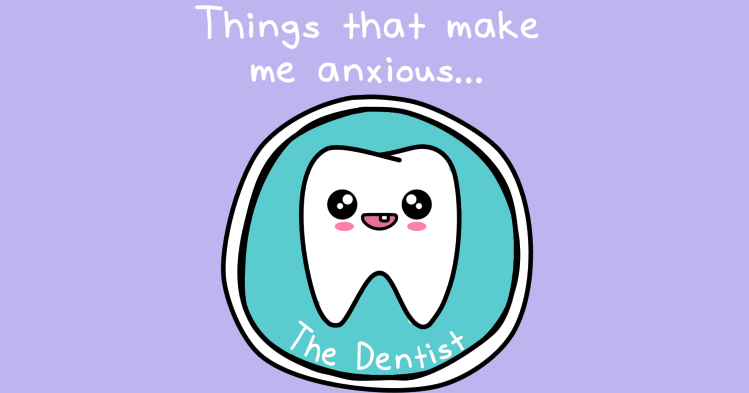Some people experience fear, which involves feeling anxious, uncomfortable or tense in a dental setting. This fear can sometimes cause individuals to delay or avoid appointments.
This anxiety can be triggered by factors such as needles, dental instruments or simply being in the dentists office.
When the level of discomfort associated with dentistry is particularly intense and leads to anxiety and reluctance to visit the dentist it may be referred to as dental phobia.
Certain mental health conditions like generalized anxiety disorder and post traumatic stress disorder (PTSD) well as a history of head or neck trauma can make someone more susceptible to developing a dental phobia. Additionally disorders like depression, bipolar disorder or schizophrenia can further increase the chances of experiencing anxiety, in relation to care.
Signs and symptoms of dental anxiety
People who experience anxiety may show the following symptoms;
- Sweating
- Rapid. Palpitations
- Decreased blood pressure, which can potentially lead to fainting
- Obvious distress, tears or signs of panic
- The use of humor or aggression as coping mechanisms to hide their discomfort.
Typically individuals, with anxiety tend to regularly skip or avoid dental appointments and may struggle with undergoing dental procedures no matter how simple or complex they are.
How dental anxiety or phobia can affect your oral health
When we avoid visits because of anxiety it can lead to worsening dental conditions and a higher chance of needing emergency procedures or more complex treatments. This avoidance can also reinforce our anxiety creating a cycle that is difficult to break.
Regular dental check ups, cleanings and x rays are essential for preventing issues and catching any problems early on. These routine exams not help keep our teeth healthy but also allow dentists to screen for oral cancer, which is especially important for individuals who smoke or consume alcohol frequently. If you notice an oral ulcer that lasts for more than two weeks it’s important to consult with a dentist right away.
Many dental diseases are caused by lifestyle choices. Can be prevented. By avoiding care we not only increase the chances of needing more extensive treatment later on but also miss out on learning about proper oral care practices.
The lifestyle factors that contribute to disease are similar to those that increase the risk of conditions, like diabetes, obesity, heart disease, strokes and certain types of cancer.
These factors encompass intake of sugary foods and drinks smoking and regular alcohol consumption. Hence it is crucial to pay attention to both oral and general health by emphasizing the importance of brushing teeth twice a day and flossing once a day.
Causes of dental anxiety and phobia
The reasons behind anxiety can include;
- Having an experience in a dental or medical setting.
- Past traumatic events involving the head and neck regions.
- Going through distressing situations, including abuse.
- Underlying conditions like anxiety, depression or post traumatic stress disorder (PTSD).
- Feeling that the oral cavity is a space and dental procedures are seen as intrusions into that space.
- Fear of losing control over ones decisions.
- Difficulties related to trust and building a relationship with professionals.
- Experiencing anxiety due to disorders such as agoraphobia (fear of being in unavoidable circumstances) claustrophobia (discomfort in confined spaces) or obsessive compulsive disorder (OCD) where hygiene concerns are dominant.
These factors contribute to the development of anxiety, in individuals.
Who may be affected by dental fear and anxiety
Dental anxiety is something that affects people of all ages.
When children have a dental experience in the past they have the potential to overcome their anxiety if future visits are handled with care and they receive comprehensive support. On the hand adults who experience dental anxiety tend to continue feeling anxious about dental appointments throughout their lives.
Many patients, with anxiety can recognize dentists who show empathy and understanding which helps them navigate through their dental visits more comfortably.
How to deal with dental anxiety or dental phobia
Fear or anxiety about going to the dentist can be reduced through approaches. It’s important to communicate any feelings of anxiety with your dentist. By discussing your triggers for anxiety dental professionals can customize strategies to meet your individual needs.
There are psychological techniques that can help cope with dental fear;
- Practice controlled breathing.
- Engage in practices.
- Distract yourself by listening to music or using devices.
- Try guided visualization techniques.
- Use systematic muscle relaxation methods.
- Agree on a gesture with your dentist to temporarily pause treatment like raising your left index finger or hand.
- Consider using a weighted blanket (if you have one).
- Explore hypnotherapy techniques.
In some cases it may be beneficial to seek help from a health professional. Focused therapeutic approaches, such, as behavioral therapy often yield positive outcomes.
For individuals experiencing dental anxiety or phobia medical intervention might be necessary. This could involve the use of analgesia (commonly known as “happy gas”) anti anxiety medications, conscious sedation (sometimes called “twilight sedation”) or even general anesthesia.
Relative analgesia (happy gas)
Nitrous oxide, also known as ” gas” or “laughing gas ” is often used in dental procedures to help patients relax. To administer it a mask is placed on the patients face. They breathe in a mixture of oxygen and nitrous oxide. The effects of oxide kick in quickly and wear off soon after its given.
When under the influence of oxide patients feel relaxed but remain conscious. They can still interact with the dentist. Understand what they hear although their memory of the entire experience might be somewhat limited after the treatment.
Most people find the effect of nitrous oxide enjoyable. However there are cases where patients might feel uncomfortable, with the sensation, which may require exploring sedation methods.
Anti-anxiety medication (anxiolytic tablets taken by mouth)
Occasionally dentists or doctors may prescribe anti anxiety medications like temazepam to help anxious patients feel more at ease. Usually a small dose of acting medication is given about an hour before the dental appointment.
It’s crucial to consult with a dentist or doctor before using these medications. Since they have effects it’s important for patients to arrange for someone to accompany them and provide transportation to and, from the dental clinic as it is considered unsafe to drive after taking these drugs.
Conscious sedation
Intravenous (IV) sedation involves the administration of sedatives into a vein typically in the arm or hand. This type of sedation can be provided by a dentist who has received training in sedation techniques or an anesthesiologist. IV sedation can be conducted either in an office with specialized equipment or in a hospital setting.
During IV sedation, which is commonly referred to as “twilight sedation ” patients experience relaxation. May enter a state of light sleep. However they remain responsive to cues. There may be side effects after the procedure such as lingering drowsiness or occasional nausea. It is highly recommended that patients avoid driving after undergoing IV sedation.
It’s important to note that different dentists offer options for sedation. The choice of sedation method may depend on medical conditions and current medications as some cases might make IV sedation inappropriate or contraindicated. It is advisable to consult with your dentist, for guidance tailored to your specific needs.
General anaesthesia
Procedures that require anesthesia are typically conducted in a hospital setting with both the dentist and an anesthesiologist overseeing the process. General anesthesia ensures that patients are deeply unconscious during the procedure. However it’s important to note that there can be some side effects such as nausea and a longer recovery period compared to sedation methods.
While general anesthesia can be beneficial for individuals it’s crucial to understand that it doesn’t inherently provide patients with coping mechanisms for dental anxiety or help them become accustomed to regular dental visits.
A consultation with the dentist before the procedure is mandatory and depending on the nature of the treatment a postoperative evaluation may also be required. The evaluation by an anesthesiologist is essential prior to administering anesthesia. Patients should refrain from driving after undergoing this procedure.
Certain dental treatments yield results when performed over multiple sessions, which may limit options for those who choose to solely rely on general anesthesia.
In some cases receiving pre treatment in a dental environment before undergoing general anesthesia can improve oral preparation and ensure better effectiveness during the session.
It is advisable to combine anesthesia with alternative strategies so that certain procedures can be carried out without resorting to this level of sedation. Therefore reserving time, under anesthesia for more complex treatments is recommended.
References
- Öst, L. G. and Skaret, E. (2013). Cognitive Behaviour Therapy for Dental Phobia and Anxiety. Wiley-Blackwell, John Wiley & Sons.
- Gatchel, R. J., Ingersoll, B., Bowman, L., Robertson, C. M. and Walker, C. (1983). The prevalence of dental fear and avoidance: A recent survey study. Journal of American Dental Association, 107(4), 609-610.
- Davison, G. (2000). Stepped care: doing more with less? Journal of Consulting and Clinical Psychology,68, 580-585.
- Rachman, S. (1977). The conditioning theory of fear acquisition: A critical examination. Behaviour Research and Therapy, 15, 375-387.
- Seligman, M. (1971). Phobias and preparedness. Behaviour Therapy, 2, 307–320
- American Psychiatric Association (1994). Diagnostic and Statistical Manual of Mental Disorders, 4th edn. Washington DC: American Psychiatric Association.
Mark Willson, holding a Ph.D., functions as a psychotherapist in Washington, D.C. His specialized fields encompass addiction, anxiety, depression, as well as sexuality and interpersonal connections. Dr. Willson holds the distinction of being a diplomat for the American Board of Addiction and Anxiety, further serving as a certified counselor and addiction specialist.
Aside from his personal professional endeavors, Dr. Wilson has engaged in roles as an author, journalist, and creator within substantial medical documentary projects.




